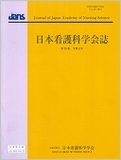Japanese
English
- 販売していません
- Abstract 文献概要
- 参考文献 Reference
要旨
目的:大腸切除術を受け外来通院する75歳以上の高齢者が術後に経験する生活の変化と変化への対応について明らかにする.
方法:研究参加者9名に半構造化面接を実施し,質的内容分析を行った.
結果:大腸切除術後の高齢者は,生活の変化を経験し様々な変化に対応していた.術後期の生活の変化の認識は《生活機能の低下を経験する》,《気力や体力の低下により活動量が低下する》,《症状がないもしくはあっても生活は変化しない》の3つだった.回復・適応期や維持期においては,老いによる機能低下を自覚するようになる高齢者がおり,生への期待と最期の迎え方を考えるといったある程度肯定的な変化と,生と老いの狭間で葛藤を感じる変化に分類され,一人の高齢者が両方を同時に感じる場合もみられた.
結論:大腸切除術後高齢者の退院後における支援では,疾患や症状の評価だけでなく,退院後に生じる生活の変化の継続的な理解と,その変化や高齢者自身が行っている対応に応じた支援を行っていくことが有益である.
Purpose: To describe how elderly patients experience and respond to the life changes after colorectal cancer surgery.
Methods: Semi-structured interviews of nine elderly patients, who had undergone surgery for colorectal cancer, followed by qualitative content analysis of the responses.
Results: Elderly patients experienced changes in life after colorectal cancer surgery. These changes were perceived differently by each patient. There are three types of recognition of the life changes in the post-operative period: experiences a decline in the life function, decrease in activity due to a decline in energy and physical strength, and no symptoms, or even if there are symptoms, the life does not change. During the recovery/adaptation and maintenance period, patients became aware of functional decline due to aging: some were aware of positive changes, such as life expectancy, while others became aware of the conflict between life and aging. Additionally, one patient felt both these changes at the same time.
Conclusion: In post-discharge support for elderly patients after colectomy, it would be desirably to provide support not only to evaluate disease and symptoms, but also in the continuous understanding of the life changes after surgery and the response of the patients themselves.
Copyright © 2019, Japan Academy of Nursing Science. All rights reserved.


